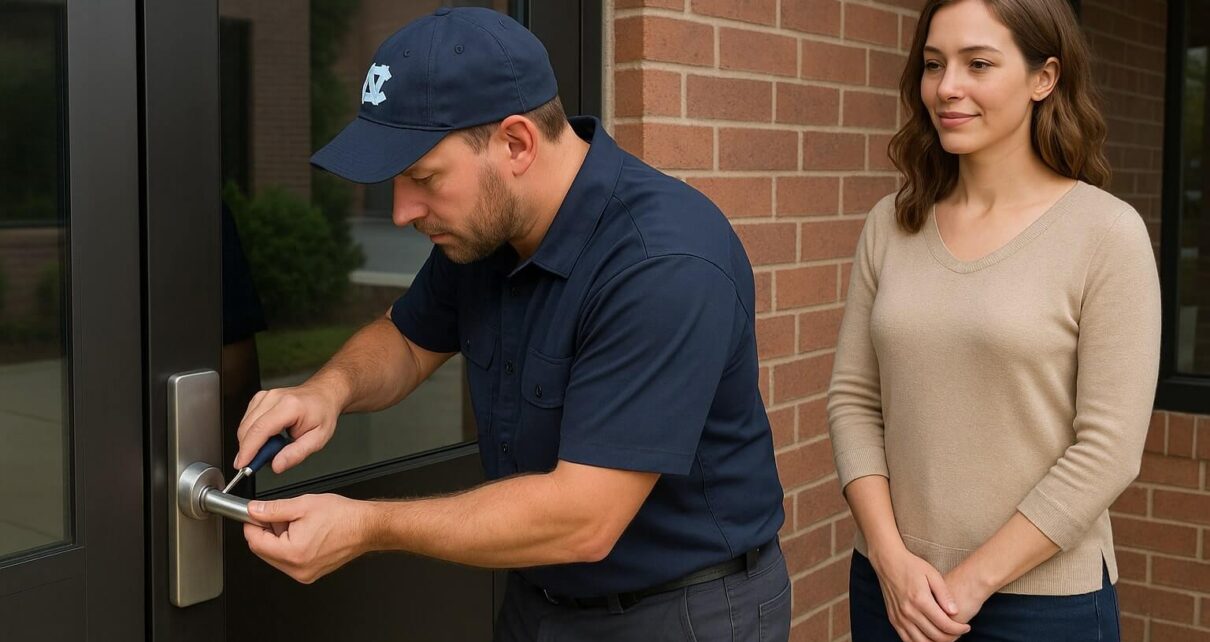Table of Contents
Finding a trustworthy locksmith north carolina professional can be challenging, especially during emergency situations when you’re locked out of your home or business. North Carolina homeowners need reliable locksmith services for various construction and repair projects, from installing new security systems to emergency lockout assistance. Whether you’re dealing with a broken lock, need key duplication, or require comprehensive security upgrades, selecting the right locksmith north carolina service provider is crucial for your safety and peace of mind.
The locksmith industry in North Carolina has grown significantly, with numerous family-owned businesses and corporate chains offering services across cities like Raleigh, Charlotte, Greensboro, and Wilmington. Understanding how to identify legitimate, licensed professionals versus potential scammers can save you money, time, and potential security risks. This comprehensive guide will help you navigate the process of selecting a reliable locksmith service that meets your specific needs and budget requirements.
Understanding North Carolina Locksmith Licensing Requirements
North Carolina stands among only 15 states that require locksmith licensing, making it illegal to advertise or work as a locksmith without proper credentials. This regulatory framework provides consumers with additional protection when selecting locksmith services. The North Carolina Locksmith Licensing Board oversees professional standards and maintains a verification system where consumers can check a locksmith’s license status online.
Licensed locksmiths in North Carolina must undergo formal training, pass certification examinations, and maintain continuing education requirements to stay current with security technologies and industry best practices. When hiring a locksmith, always request to see their license and identification upon arrival. Legitimate professionals will readily provide this information and should arrive in clearly marked company vehicles displaying business names and contact information.
The licensing requirement also ensures that locksmiths carry appropriate insurance coverage, protecting both the service provider and customers from potential damages or accidents during service calls. This protection becomes particularly important during complex installations or emergency situations where property damage could occur.
Researching Locksmith Services Before Emergencies
Proactive research proves invaluable when selecting locksmith services, as emergency situations rarely provide adequate time for thorough vetting. Start by identifying family-owned and operated businesses in your area, as these companies often prioritize customer relationships and community reputation over quick profits. Many established North Carolina locksmith businesses have served their communities for decades, building trust through consistent, quality service.
Online reviews provide valuable insights into service quality, response times, and pricing practices. Check multiple platforms including Google Reviews, Better Business Bureau ratings, and specialized trade directories. Pay attention to recent reviews that mention specific services you might need, such as residential lockouts, commercial security installations, or automotive key replacement.
Professional locksmith organizations offer additional verification resources. The North Carolina Locksmith Association maintains member directories that can help you identify verified professionals in your area. Membership in these organizations typically indicates commitment to industry standards and ongoing professional development.
Essential Questions to Ask Potential Locksmith Services
Before hiring any locksmith service, prepare a list of specific questions to evaluate their professionalism and capabilities. Start with basic information about their business location, as legitimate companies maintain physical addresses rather than operating solely from mobile units. Ask about their specific experience with your type of lock or security system, as some locksmiths specialize in particular brands or technologies.
Pricing transparency represents another crucial factor in locksmith selection. Request detailed estimates that include service call fees, labor costs, and potential parts expenses. Understand what factors might cause price changes during the service call, such as lock complexity or time of day. Reputable locksmiths provide clear pricing structures and accept multiple payment methods beyond cash-only transactions.
Emergency availability and response times vary significantly among service providers. Clarify their definition of “24/7 service” and understand any additional charges for after-hours, weekend, or holiday calls. Some companies maintain multiple technicians for faster response times, while others operate with single-person crews that might result in longer wait periods during busy periods.
Evaluating Service Specializations and Capabilities
Modern locksmith services extend far beyond traditional lock and key work, encompassing advanced security technologies, access control systems, and smart home integrations. Evaluate potential service providers based on their expertise in areas relevant to your needs. Residential customers might prioritize deadbolt installation, rekeying services, and emergency lockout assistance, while commercial clients often require master key systems, high-security locks, and electronic access control.
Automotive locksmith services represent another specialized area, particularly important given the complexity of modern vehicle security systems. Advanced car key programming, transponder technology, and keyless entry systems require specialized equipment and training that not all locksmiths possess. Verify that your chosen service provider maintains current certifications for your vehicle’s make and model.
Commercial locksmith services often involve more complex projects requiring additional certifications and insurance coverage. Fire door inspections, panic device installations, and compliance with building codes demand specialized knowledge and certifications. Some locksmiths hold unique qualifications, such as certified Fire Door inspectors, setting them apart in commercial markets.
Understanding Pricing Structures and Service Costs
Locksmith service pricing in North Carolina varies based on service type, complexity, and timing. Residential services typically range from $75 to $250 for standard calls, with emergency services commanding premium rates during evenings, weekends, and holidays. Rekeying services generally cost between $19 to $60 per lock cylinder, while deadbolt installations range from $50 to $200 depending on lock quality and security features.
Commercial locksmith services involve higher complexity and typically cost between $75 to $350 per hour. High-security lock installations, access control systems, and master key system development require specialized expertise and equipment, justifying premium pricing. Understanding these cost structures helps you budget appropriately and avoid surprise charges.
Automotive locksmith services present unique pricing challenges due to vehicle complexity variations. Basic lockout services might cost $50 to $100, while key replacement and programming can range from $100 to $400 depending on vehicle technology. Emergency after-hours automotive services often include additional surcharges up to $150 beyond standard rates.
Verifying Insurance and Professional Credentials
Professional locksmith services maintain comprehensive insurance coverage protecting both service providers and customers from potential damages or accidents. Verify that your chosen locksmith carries general liability insurance, bonding, and workers’ compensation coverage. This protection becomes particularly important during complex installations or when working with expensive security equipment.
Professional certifications beyond basic licensing demonstrate commitment to industry excellence and ongoing education. Look for locksmiths affiliated with organizations like the Associated Locksmiths of America (ALOA) or specialized certifications in areas like safe servicing, automotive technology, or electronic security systems. These credentials indicate advanced training and commitment to professional standards.
Business longevity often correlates with service quality and community trust. Established locksmith businesses with decades of local experience typically maintain strong reputations and customer relationships. Family-owned operations often provide more personalized service and maintain stronger accountability to their communities compared to large corporate chains.
Red Flags to Avoid When Selecting Locksmith Services
Several warning signs indicate potentially problematic locksmith services that consumers should avoid. Extremely low advertised prices often mask hidden fees or substandard service quality. Legitimate locksmith work requires skilled labor, quality materials, and professional equipment, making unrealistically low pricing unsustainable for quality service providers.
Cash-only payment policies represent another significant red flag, as professional businesses typically accept multiple payment methods including checks and credit cards. Legitimate locksmiths provide detailed written invoices itemizing services and parts, creating accountability and documentation for warranty purposes.
Unmarked vehicles or technicians unable to provide proper identification suggest unprofessional operations that might lack proper licensing or insurance coverage. Professional locksmiths arrive in clearly marked company vehicles and readily provide identification, licensing information, and business credentials upon request.
Key Takeaways
- North Carolina requires locksmith licensing, providing consumer protection through regulated professional standards
- Research locksmith services proactively before emergencies occur to ensure quality selection
- Verify licensing, insurance, and professional credentials before hiring any locksmith service
- Family-owned businesses often provide more personalized service and stronger community accountability
- Request detailed pricing estimates and understand factors that might affect final costs
- Professional locksmiths arrive in marked vehicles and readily provide identification and credentials
- Avoid cash-only services and extremely low pricing that might indicate substandard quality
- Check multiple review platforms and professional organization memberships for service verification
- Specialized services like commercial security or automotive work require additional certifications and expertise
FAQ
What should I do if I’m locked out of my home in North Carolina?
Contact a licensed North Carolina locksmith service immediately and verify their credentials before allowing entry. Request identification and licensing information upon arrival, and expect to provide your own identification to prove property ownership. Legitimate locksmiths will ask for verification to ensure they’re providing services to authorized individuals.
How can I verify a locksmith’s license in North Carolina?
Visit the North Carolina Locksmith Licensing Board website and use their online verification system to check license status. You can search by the locksmith’s name or business name to confirm current licensing. This verification system helps consumers avoid unlicensed operators who might provide substandard or fraudulent services.
What’s the average cost for locksmith services in North Carolina?
Residential locksmith services typically range from $75 to $250 for standard calls, while commercial services cost between $75 to $350 per hour. Emergency services during evenings, weekends, or holidays often include additional surcharges. Specific services like rekeying cost $19 to $60 per cylinder, while deadbolt installations range from $50 to $200 depending on lock quality and complexity.




